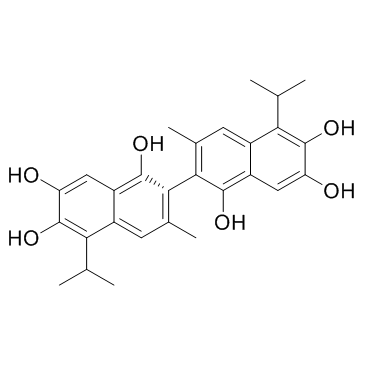66389-74-0
| Name | methanol,3-methyl-5-propan-2-yl-2-(1,6,7-trihydroxy-3-methyl-5-propan-2-ylnaphthalen-2-yl)naphthalene-1,6,7-triol |
|---|---|
| Synonyms |
[2,1',6,6',7,7'-hexol,3,3'-dimethyl-5,5'-bis(1-methylethyl)-,(+)
(+)-Apogossypol |
| Description | (+)-Apogossypol is a pan-BCL-2 antagonist. (+)-Apogossypol binds to Mcl-1, Bcl-2 and Bcl-xL with EC50s of 2.6, 2.8 and 3.69 µM, respectively. |
|---|---|
| Related Catalog | |
| Target |
Mcl-1:2.6 μM (EC50) Bcl-2:2.8 μM (EC50) Bcl-xL:3.69 μM (EC50) |
| In Vitro | In agreement with NMR binding and fluorescence polarization assays (FPAs) data, (+)-Apogossypol displays potent binding affinity to Bcl-xL with Kd values of 1.7 µM[1].To investigate the inhibitory effects of (+)-Apogossypol and Gossypol on LNCaP cell survival, the MTT assay is performed. The results demonstrate that (+)-Apogossypol inhibits the proliferation of LNCaP cells in a time- and dose-dependent manner, in a similar way with Gossypol. The concentration for 50% inhibition (IC50) on LNCaP cells within ~72 h is 9.57 μM, while the IC50 of Gossypol on LNCaP cells is 10.35 μM[2]. |
| In Vivo | Due to its modified structure, (+)-Apogossypol is expected to exhibit lower toxicity while maintaining the significant anti-growth and anti-tumor activities in vitro, similar to those of Gossypol. The anti-cancer effect of (+)-Apogossypol is evaluated in mice bearing subcutaneous LNCaP cell xenografts. The tumor growth is monitored and measured by a caliper and balance. The survival rate of the mice is notably improved by (+)-Apogossypol. Of note, the tumor sizes are also markedly decreased by (+)-Apogossypol treatment (P<0.01)[2]. |
| Cell Assay | The cytotoxic effect of (+)-Apogossypol and Gossypol on prostate cancer cell lines is measured by the MTT assay. LNCaP cells are seeded onto sterile 96 well flat bottomed plates and incubated overnight. Then diluted (+)-Apogossypol (1 and 10 μM) and Gossypol are added into each well with gradient concentrations (2-20 μM). For the cell viability test, tumor cells are suspended in a mixed solution of 200 μL complete medium and 0.2 μL DMSO, and wells with 200 μL complete medium are used as blank controls. The plates are incubated at 37°C with 5% CO2 for 72 h. The medium is then removed, and 0.5 μM MTT is added into the wells. After another 4 h, 150 μL DMSO is added into each well. The absorbance is read at 570 nm on a microplate reader. The drug concentration yielding 50% cell inhibition (IC50) is determined. All experiments are performed in triplicate[2]. |
| Animal Admin | Mice[2] Female athymic nude (nu/nu) mice (4-6 weeks of age, weighing 20-25 g) are used. LNCaP cells (2×106) are injected subcutaneously into each mouse. The tumor volume is measured every two days using a caliper and calculated. When subcutaneous tumor sizes reach 150-200 mm3, these mice are randomly divided into three groups, each group consisting of 10 mice. Next, they are treated with (+)-Apogossypol and Gossypol, respectively, at 20 mg/kg intraperitoneally, q.d. every 7 d for 28 d. The vehicle control group receive the same amount of DMSO as in the treatment groups. The tumor volume is detected every day. The tumor tissues are fixed in 10% formalin solution. The tissues are embedded with paraffin, and the sections are prepared. Samples are stained with hematoxylin and eosin and microscopically examined. |
| References |
| Molecular Formula | C28H30O6S |
|---|---|
| Molecular Weight | 494.60 |
| PSA | 141.61000 |
| LogP | 6.36570 |
